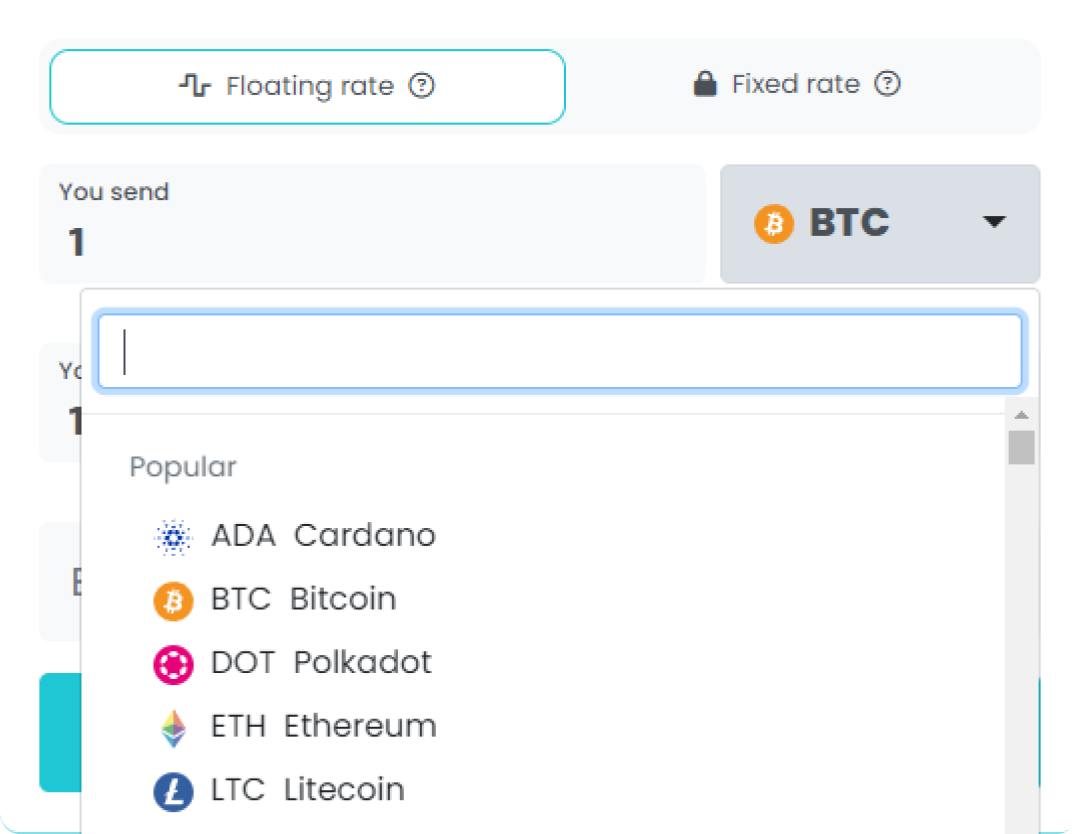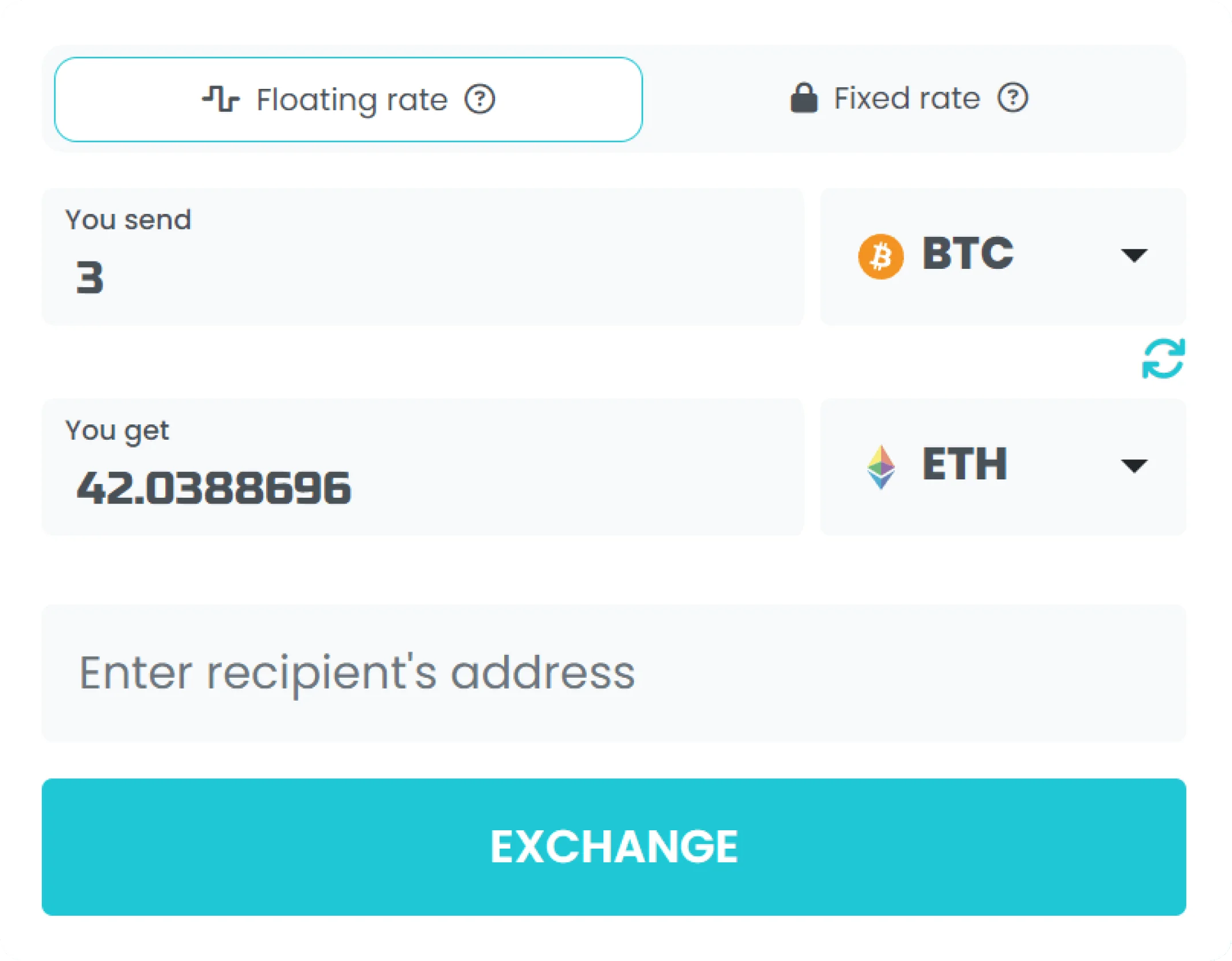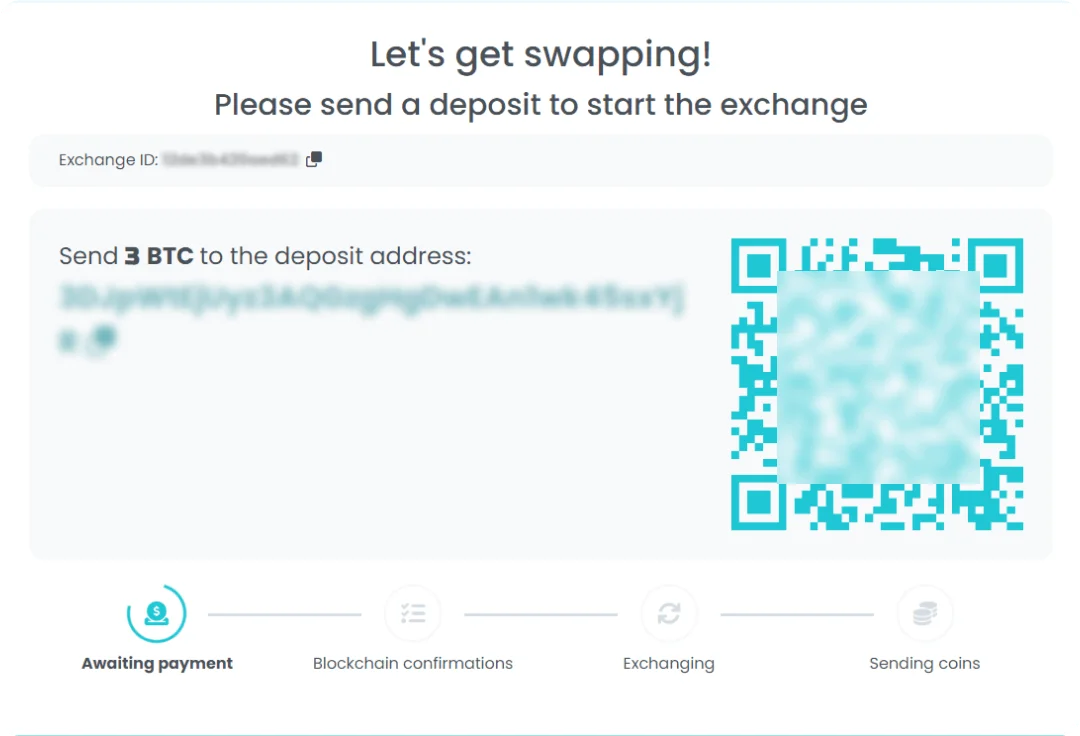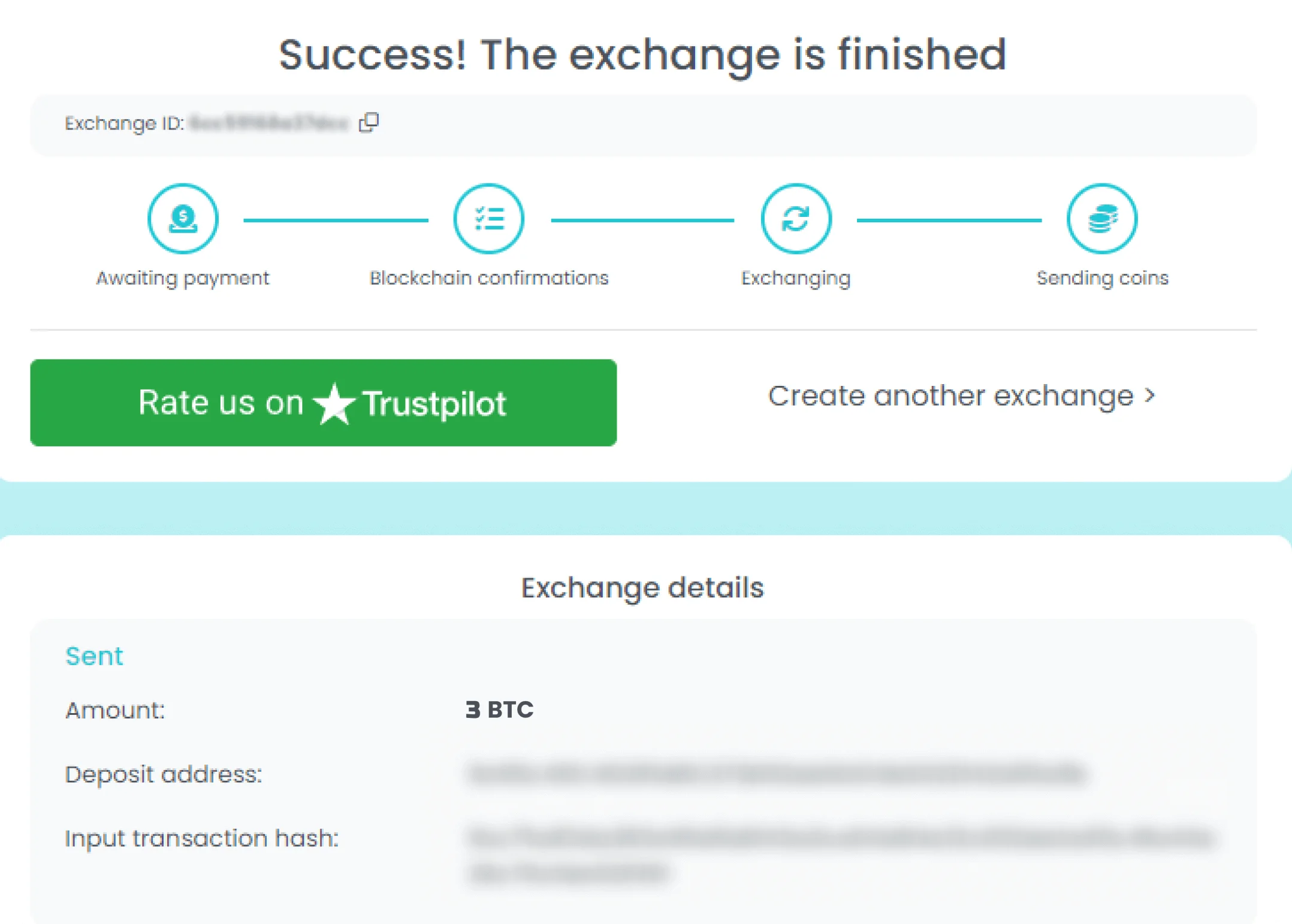How to Exchange Bitcoin (BTC)
Exchange BTC instantly
Swap Bitcoin (BTC) in a few clicks on Exchang.io.
Registration and limits free service.
How to Exchange Bitcoin in Just a Few Straightforward Steps:
If you are looking for a BTC exchange, you are in the right place. Swap Bitcoin in a matter of minutes using the Exchang.io crypto exchange. Just adhere to these 4 simple steps.




Benefits of Exchanging BTC on Exchang.io

Simple
We make sure not to overload our website with unnecessary elements. Only the things you need for smooth Bitcoin conversions.Simple and clear.

Secure
Exchang.io is the safest place to exchange BTC. Get BTC anonymously, without KYC and registration.
In touch
Write to us in any unclear situation with BTC swaps. Our support team is happy to help you 24/7.
Fast
We are constantly upgrading our platform to make Bitcoin exchanges really fast. The average speed for the exchange is about 5-15 minutes.Popular Bitcoin trading pairs
Here are some popular BTC trading pairs. You can buy BTC with every listed coin on Exchang.io.
How Much Bitcoin Can I Exchange on Exchang.io?
Exchanging on Exchang.io is unlimited. You can start swapping BTC right now, starting from the lower limit of ≈ $3.
There are no upper limits for Bitcoin exchanges at Exchang.io. Exchange Bitcoin with other cryptocurrencies from the list of over 700 coins as much as you want to.
Cross-chain exchanges are available; just choose any coin on any network and click the Exchange button, and we'll do the rest for you.
Why exchange Bitcoin?
Things you will be able to do with BTC after exchange:
As a decentralized digital currency, it offers several use cases and possibilities for its holders. Here are four things that can be done with Bitcoin:
1. Buy goods and services: One of the primary uses of the digital asset is to buy goods and services online or in person. Many merchants accept the Bitcoin as a form of payment, and some even offer discounts to customers who pay with it.
2. Hold as an investment: Bitcoin's value can fluctuate rapidly, making it an attractive asset for investors looking to diversify their portfolios. Holding Bitcoin as an investment can generate profits if its value increases over time.
3. Send money internationally: It allows for fast and inexpensive cross-border decentralized transactions without the need for intermediaries such as banks or payment processors. This makes it the best choice for remittances, donations, and other forms of peer-to-peer transactions.
4. Trade on exchanges: It can be traded on various cryptocurrency exchanges, allowing users to buy and sell it for other cryptocurrencies or fiat currencies. Trading the digital asset can be a lucrative activity for those who have knowledge of the market and trading strategies.
What is Bitcoin?
Bitcoin is a decentralized digital currency. It operates on a peer-to-peer network, enabling direct transactions between users without intermediaries like banks.
Bitcoins are generated through mining, where powerful computers validate transactions and create new coins. The total supply is capped at 21 million, with around 18.7 million in circulation as of May 2021.
Transactions are recorded on the blockchain, a transparent and secure public ledger maintained by nodes worldwide. The Bitcoin's cryptographic nature ensures transaction security, with each user having a private key for spending.
Notably, Bitcoin's infinite supply guards against inflation. It's often seen as a store of value and a hedge against traditional currencies.
Bitcoin is traded on exchanges and accepted by some merchants as payment. However, its value can be volatile and speculative due to its lack of physical backing or government support.
The crypto faces challenges like scalability, energy consumption, and regulatory uncertainty. These issues have spurred the creation of alternative cryptocurrencies (altcoins).
While BTC dominates by market capitalization, its position isn't guaranteed. The crypto landscape evolves, potentially disrupting the status quo.
Cryptocurrency enthusiasts see Bitcoin and its peers as transformative financial tools, offering freedom from centralized control. Skeptics view them as speculative or potentially problematic. Bitcoin's impact continues to unfold, making it an intriguing subject to watch.
Brief History of Bitcoin
The inception of Bitcoin dates back 2008, when a mysterious figure, or perhaps a group of visionaries, using the name Satoshi Nakamoto, wrote the game-changing whitepaper "Bitcoin: A Peer-to-Peer Electronic Cash System." With those words, Bitcoin came to life, introducing the world to a revolutionary digital currency.
In January 2009, Nakamoto mined the first Bitcoin block, also known as the "genesis block," which marked the official launch of the Bitcoin network. At that time, Bitcoin had little value and transactions were seen as bold experiments in transforming the financial landscape.
Over time, Bitcoin's appeal continued to grow, gradually gaining recognition as a groundbreaking method of payment. One moment in 2010 stands out when a programmer famously exchanged an astounding 10,000 Bitcoins for a simple meal of pizza. This event left a lasting mark on the history of Bitcoin.
However, the journey of Bitcoin was anything but ordinary. Its value skyrocketed, giving rise to cryptocurrency exchanges where enthusiastic users could trade Bitcoin. This remarkable surge in price caught the attention of the world, enticing investors and making headlines.
Fast forward to 2013, and Bitcoin reached a historic milestone by breaking through the $1,000 price barrier. Yet, its path was marked by heart-pounding price swings that left everyone amazed.
Beyond being a digital gold rush, Bitcoin's underlying technology, the blockchain, unlocked a realm of possibilities. Its transparent and secure transaction ledger captured the imagination of industries far beyond the realm of finance.
By 2021, Bitcoin had achieved meteoric heights, with its price soaring past $60,000 per coin. Its transformation from a cryptic experiment to a globally recognized, actively traded asset is a testament to the disruptive potential of blockchain technology.
Bitcoin Key Advantages and Unique Features
Its key advantages include
- Anonymity and Privacy: Transactions are cryptographically verified, ensuring user privacy and financial confidentiality.
- Elimination of Intermediaries: Bitcoin transactions occur directly between users, bypassing banks and reducing costs, making it ideal for online and cross-border payments.
- Limited Supply: With only 21 million coins, it is a hedge against inflation, unlike fiat currencies that can be endlessly printed.
- Decentralization: Free from central control, it is immune to government manipulation and is considered a safe haven during economic instability.
- High Divisibility: Bitcoin's divisibility allows for precision in small transactions, broadening accessibility.
- Transparency: All transactions are recorded on the blockchain, ensuring security and preventing double-spending.
- Global Acceptance: Many businesses worldwide, including Microsoft and Expedia, accept Bitcoin increasing its usability.
- Open-Source Innovation: Anyone can develop applications on the blockchain, resulting in various user-friendly products like wallets and payment processors.
- Irreversible Transactions: Transactions are final, eliminating chargeback risks associated with traditional payments.
- Security: Users control their private keys, making it challenging for hackers to steal Bitcoins.
The digital currency's unique mining process also incentivizes network security, facilitating instant and low-cost global transactions. Its portability, immunity to capital controls, and potential to reduce fraud make it an attractive option for individuals and industries alike, ultimately aiming to provide financial inclusion to the unbanked population.
10 Facts About Bitcoin
Bitcoin is a decentralized digital currency that operates on a peer-to-peer network. It allows for a direct rate of transactions without the need for intermediaries like banks or governments.
The asset was created in 2009 by an unknown person or group using the pseudonym Satoshi Nakamoto. The identity of Satoshi Nakamoto remains a mystery to this day, but he created the roadmap for crypto.
Bitcoin uses a technology called blockchain, which is a public ledger that records all transactions securely and transparently. Each block in the chain contains a mine cryptographic hash of the previous block, making it virtually impossible to alter past transactions.
The total supply is limited to 21 million coins. As of June 2023, approximately 18.8 million Bitcoins have already been mined, leaving around 2.2 million left to be mined.
The digital asset has experienced significant price volatility since its inception. In December 2017, its price reached an all-time high of nearly $20,000 before plummeting to below $3,500 in December 2018. As of June 2023, its price hovers around $35,000.
It can be bought and sold on any cryptocurrency exchange, where users can trade it for other crypto coins or fiat currencies like US dollars or Euros.
Transactions with Bitcoin are irreversible once they have been confirmed on the blockchain. This means that if you accidentally send Bitcoin to the wrong address, there is no way to get it back.
Bitcoin wallets, which store private keys that allow users to access their Bitcoin holdings, come in various forms, including software wallets, hardware wallets, and paper wallets.
The fee for Bitcoin transactions varies depending on network congestion and the amount of data needed to process each transaction. During periods of high demand, the fee can become very expensive.
While the digital asset is still not widely accepted as a form of payment, more and more merchants are starting to accept it, including major companies like Microsoft, AT&T, and Overstock.com.
What is the Best Place to Exchange BTC?
Looking for where to exchange bitcoin? Via Exchang.io service, you can effortlessly exchange Bitcoin for over 700+ different assets at a good rate. Begin by selecting BTC and your desired coin, paying attention to the network when making your choice. Next, provide the recipient's wallet address for the coin you're swapping to, and press 'Exchange' to continue. Deposit the required amount of BTC to the address displayed on the screen, ensuring you have the necessary amount to finalize the transaction. Once completed, check your wallet to confirm the arrival of your newly acquired coin. With Exchang.io, you can easily swap Bitcoin, allowing you to enjoy a seamless experience with an extensive selection of coins you can buy and exchange.
What is Bitcoin?
This is a decentralized digital currency that can be sent from person to person without the need for intermediaries like banks or governments. It operates on a peer-to-peer network, where transactions are recorded on a public ledger called the blockchain.
How do I buy Bitcoin?
You can buy BTC from a cryptocurrency exchange or marketplace using fiat currency (like USD) or other crypto coins (like Ethereum). You can also earn Bitcoin by accepting it as payment for goods or services.
How is Bitcoin different from traditional currency?
Any government or physical commodity does not back the digital currency, and the market demand for it determines its value. Transactions with Bitcoin are irreversible and typically have a lower fee than traditional bank transfers.
Is Bitcoin anonymous?
Bitcoin transactions are pseudonymous, meaning that users can transact without revealing their true identity. However, transactions can still be traced on the blockchain, which is a public ledger visible to anyone who has access to it.
What is a Bitcoin wallet?
A BTC wallet is a software application that allows you to securely store, send, and receive Bitcoin. It contains a private key that is used to sign transactions and proves ownership of the digital asset stored in the wallet.
Can I lose my Bitcoin?
Yes, if you lose your private key or your wallet becomes inaccessible, you may lose access to your Bitcoin forever. It's important to keep your private key safe and back up regularly.
What is mining?
To mine is the process by which new Bitcoins are created, and transactions are recorded on the blockchain. Miners use powerful computers to solve complex mathematical problems and are rewarded with newly created Bitcoin for their mine efforts.
What is the current price of Bitcoin?
The price of the asset is constantly changing based on market demand. You can check the current price of the currency on coinmarketcap and various cryptocurrency exchanges and marketplaces.
